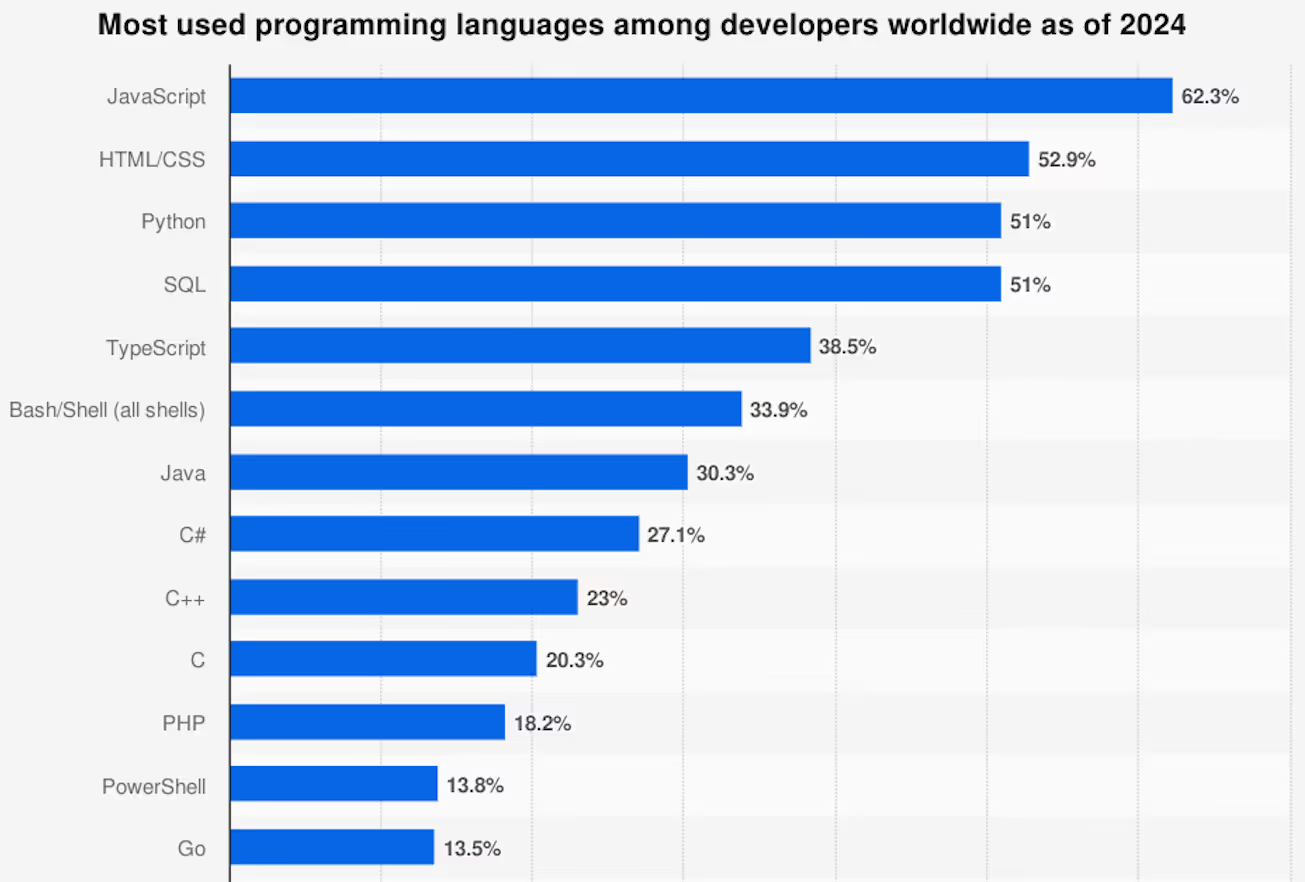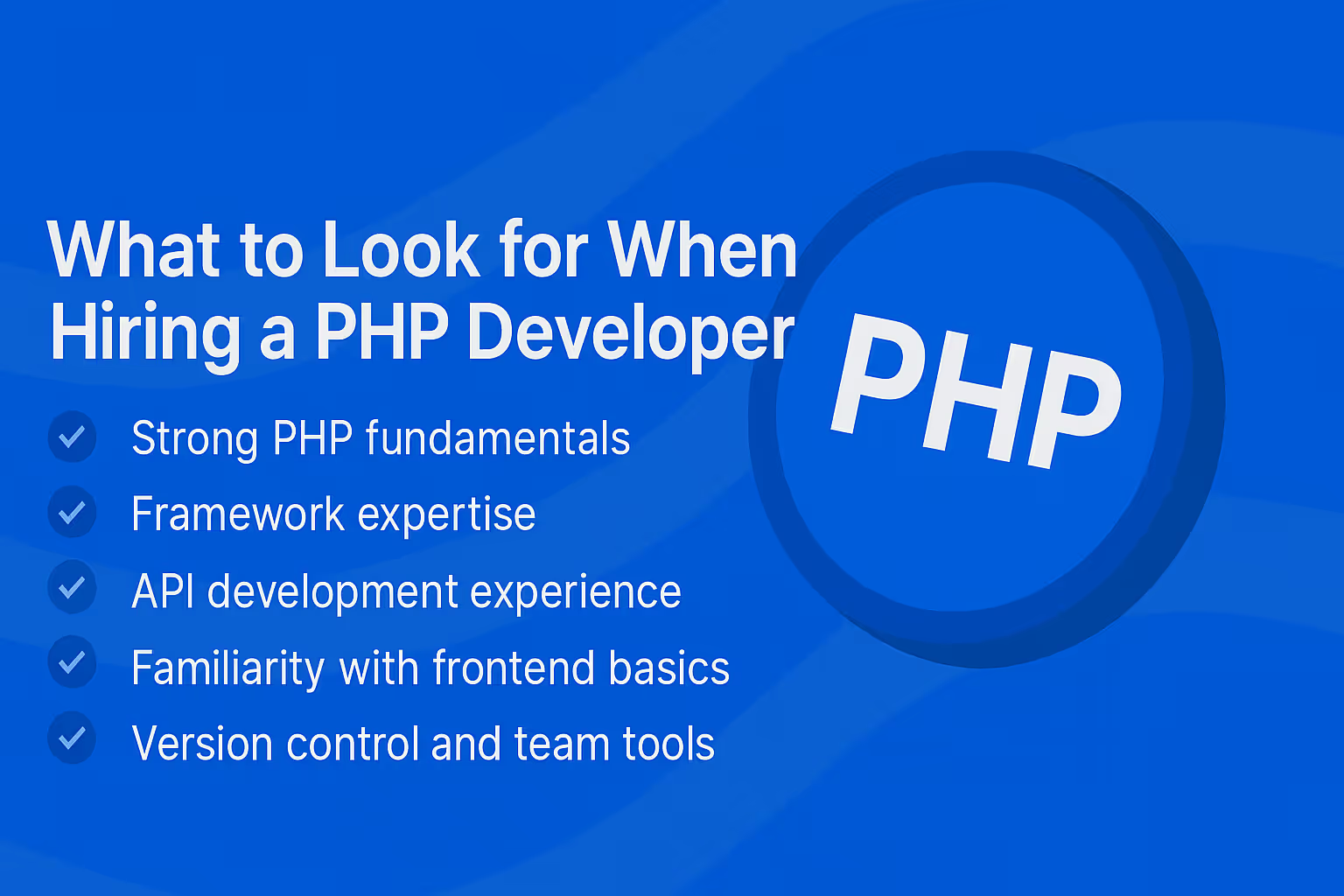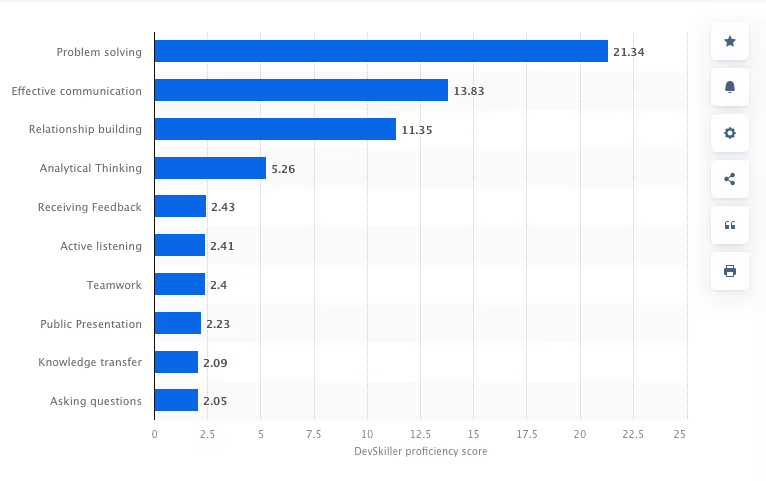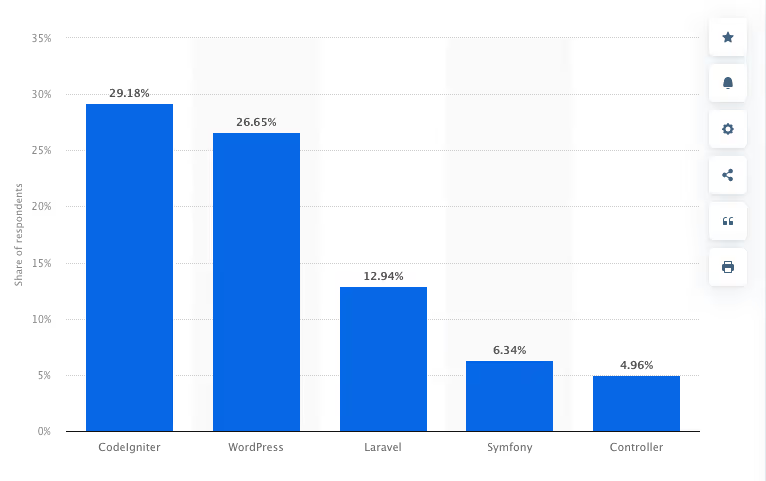
Discover effective strategies to hire the right PHP developer quickly. Streamline your search and find top talent with ease. Read the full guide now!

In this guide, we’ll break down how to hire PHP developer who can deliver, depending if you're building from scratch or optimizing a growing PHP project.
If you’re building a new MVP, launching a startup, or scaling your backend, you may need to hire PHP developer. PHP powers over 79% of all websites to some degree. This makes PHP one of the most in-demand backend technologies around. Surprisingly, only 18.2% developers know their way around it.

In this guide, we’ll break down how to hire PHP developer who can deliver, depending if you're building from scratch or optimizing a growing PHP project.
We’ll cover everything you need to know: how to hire PHP developers quickly, what skills to look for, where to find the top PHP programmers, cost expectations, and why outsourcing to a team like Empat can be a game-changer for startups.
To hire PHP developer, you first need to clarify your project requirements — what you’re building, the expected timeline, your tech stack (e.g. Laravel, Symfony, WordPress), and whether you need a solo developer or a full cross-functional team.
Decide what you are searching for:
Once you know what you're looking for, shortlist developers or companies based on:
If you need fast onboarding, flexibility, and lower risk, outsourcing to a professional team delivering quality software development solutions like Empat can help you move faster with fewer hiring headaches. Our developers work directly with startups to ship real products — not just code.
If you’ve heard that “PHP is dead,” you’re not alone — but the reality is very different. In 2025, PHP remains one of the most widely used and actively maintained server side scripting languages on the web.
Here’s why PHP is still a smart choice for companies building everything from MVPs to large-scale platforms:
PHP is the backbone of WordPress, which alone powers 63% of all websites globally. That’s not a sign of a dying language — it’s proof of massive, ongoing demand for dynamic web pages . Beyond WordPress, PHP is the core language behind Laravel, Magento, Drupal, and Symfony, all of which continue to evolve with modern features and security standards.
PHP has been around for decades, which means a huge global community, extensive documentation, and countless libraries and tools. It's easier (and cheaper) to find experienced PHP developers for database management than those in newer stacks — especially when you’re under tight deadlines or working on a budget.
Compared to some newer stacks, PHP development is often more affordable, both in terms of developer rates and time to market. Frameworks like Laravel make it faster to build secure, scalable MVPs without reinventing the wheel. For startups, this means more software development product for less money — without compromising quality.
For example, according to the 2023 Stack Overflow Developer Survey, PHP is among the least expensive technologies to hire for, with a median annual salary of $58,899 — significantly lower than more niche languages like Zig, which has a median salary of $103,611.
PHP isn’t just for small websites — it powers large-scale platforms too. Many enterprise systems and eCommerce platforms use PHP, including Facebook (in its early days), Slack (for backend services), and Magento. Whether you're building a fast MVP or a platform for millions of users, PHP is a proven, production-ready technology.
PHP is a mature, cost-efficient, and reliable choice — especially when paired with the right developers or software outsourcing.
{{first}}
Hiring a PHP developer can bring serious value at nearly every stage of your product lifecycle — from building an MVP to developing an enterprise application. Because PHP is flexible, well-supported, and developer-friendly, it's a go-to choice for startups looking to hire dedicated PHP developers and growing teams alike.
Here are some common scenarios where hiring expert PHP developers makes perfect sense:
If your stack includes modern PHP frameworks like Laravel or Symfony, you’ll want developers who understand their architecture, tooling, and conventions. A skilled remote PHP developer can help you ship faster while avoiding common pitfalls in structure and scalability.
Hiring and onboarding full-time backend software engineers takes time — time you might not have. Bringing in experienced PHP developers (freelance among Upwork competitors or via a dedicated team) can help you expand capacity on-demand, without long-term commitments.
Upgrading from older PHP versions or migrating legacy systems to modern frameworks is no small task. It requires deep PHP frameworks knowledge, version control systems testing discipline, and thoughtful planning — especially when uptime and data integrity are at stake.
PHP is still the leading language for building custom WordPress plugins, CMS solutions, and eCommerce platforms like Magento or WooCommerce. If your product requires tight integrations, payment systems, or content management, experienced PHP programmers can deliver stable, secure solutions.
If your core team is focused on product, growth, or frontend, outsourcing backend development to a reliable PHP partner can help you move faster with fewer distractions. A team can take full ownership of backend systems — from architecture and APIs to deployment — while staying aligned with your business goals.
One of the biggest advantages of PHP development is its flexibility — and that applies to how you hire, too:
In both cases, working with a seasoned startup software development team gives you access to PHP experts who already know how to build and launch apps — whether you're on a tight timeline or planning for long-term growth.
Hiring PHP developer who fits your project needs is crucial for building maintainable and secure applications. Here are the key qualities and skills you should prioritize when observing how PHP developers work:

At the core, your PHP developer should write clean, secure, and efficient PHP code. This means having a solid grasp of core language features like object-oriented programming (OOP), PHP programming language, error handling, and best practices for code organization.
They should understand how to write maintainable code that can be easily tested and debugged, using tools like PHPUnit or similar testing frameworks. Secure coding practices are also essential to prevent common vulnerabilities such as SQL injection or cross-site scripting (XSS).
Most modern PHP applications rely on frameworks to speed up development and enforce good design patterns. Look for developers with hands-on experience in your chosen framework—Laravel and Symfony are the most popular today, but others like CodeIgniter or Zend may be relevant depending on your stack. Familiarity with a framework means they know how to structure projects, manage dependencies, and use built-in tools to build robust applications quickly.
APIs are the backbone of many web and mobile applications. A strong PHP developer should be comfortable developing and consuming RESTful APIs and increasingly GraphQL APIs.Experience in full stack development is a must as well. They should understand how to implement authentication (OAuth, JWT, API keys), implement validation, and eliminate errors.
While not always required, it’s highly beneficial if your PHP developer has some understanding of frontend technologies like HTML, CSS, and JavaScript. This knowledge is especially important if they’ll play a full-stack role, collaborating with frontend developers or handling tasks like integrating backend APIs with UI components. It helps facilitate smoother communication and better end-to-end product quality.
Modern development of PHP projects is collaborative and automated. Your PHP developer should be proficient with version control systems like Git, and platforms such as GitHub or GitLab, as well as various php frameworks. Experience with tools like Docker and CI/CD pipelines is a big advantage, as they help improve code quality, automate testing, and speed up deployment.
Beyond technical ability, soft skills are critical for success of PHP projects, especially in startup environments where collaboration and adaptability are key. Look for developers who communicate clearly, take ownership of their work, and are proactive problem-solvers. Being able to work effectively with cross-functional teams, receive and incorporate feedback, and manage time and priorities independently will help your project run smoothly and efficiently.

The cost of hiring a PHP developer depends on many factors — including experience, location, and the hiring model. Here's a breakdown of common engagement types and their typical costs when you hire PHP programmers:
Freelance PHP developers usually charge by the hour or per project. Rates can vary significantly depending on expertise and geography, typically ranging from $25 to $75+ per hour. Freelancers are often a good fit for smaller projects, quick fixes, or startups with limited budgets who need flexibility. However, managing freelancers can require more hands-on oversight.
Hiring a full-time remote PHP developer offers the benefits of deep integration into your team and product, but usually comes with a fixed salary and associated costs. In the US and Western Europe, median PHP developer salaries range from $58,000 to $75,000 per year, while developers in Eastern Europe or Asia might command lower salaries, often between $20,000 and $40,000 annually. Hiring full-time also involves additional overhead such as benefits, taxes, and HR management.
Outsourcing PHP development to agencies or managed teams often results in a lower total cost of ownership. These teams provide a full product squad — including top php developers, project managers, and QA engineers — bundled in a flexible engagement model. This eliminates recruitment overhead, accelerates onboarding, and provides the ability to scale your team up or down based on your project phase. Pricing here can vary but is generally competitive, offering startups a cost-effective and reliable alternative to full-time hiring.
For startups and growing businesses, partnering with an agency like Empat means gaining access to vetted PHP experts alongside dedicated product managers, and QA specialists — all without the usual complexities of hiring and managing a full team. This flexibility and turnkey approach help you focus on building your product faster while controlling costs.
{{second}}
Once you’ve decided to bring the best PHP developer on board, the next question is: Where should you actually look? The answer depends on your timeline, budget, technical needs, and whether you're hiring for the short term or planning long-term product development.
Let’s walk through the four main options — and break down the pros and cons of each in a clear, side-by-side format.
If you need to move fast and want flexibility, freelance platforms are often the first stop for startups and solo founders. These platforms connect you with independent developers from around the world who build dynamic websites .
Examples: Upwork and its competitors, Toptal, Freelancer, Fiverr alternatives
Pros of freelance PHP developers ✅ |
Cons of freelance PHP programmers ❌ |
Fast access to global talent |
Quality and reliability vary widely |
Flexible pricing and short-term contracts |
Time-consuming vetting process |
Ideal for small or one-off tasks |
Risk of freelancers dropping out mid-project |
No long-term commitment |
Little integration with your core team |
Best for: Short-term fixes, one-off tasks, or early MVPs on a budget.
If you're looking for more control over who you work with, job boards and tech networks allow you to connect with freelance or full-time PHP web developers directly.
Examples: Stack Overflow Jobs, AngelList, We Work Remotely, LinkedIn
Pros ✅ |
Cons ❌ |
Full control over hiring process |
Slower recruitment timeline |
Better long-term cultural fit |
Requires internal HR/time to manage hiring |
Great for building in-house teams |
Higher cost (salaries, benefits, overhead) |
Best for: Companies growing an internal team or hiring for long-term product development.
Hiring a full-time, in-house PHP developer offers tight collaboration and deep product ownership — but also requires more time and budget.
Pros of hire php programmers in-house ✅ |
Cons of hire php programmers in-house ❌ |
Strong alignment with company culture |
Long hiring cycles (weeks or months) |
Institutional knowledge stays in-house |
Higher fixed costs (salary, benefits, HR) |
Better collaboration across departments |
Less flexibility to scale up/down quickly |
Best for: Funded startups and scaling companies with a long-term roadmap.
Outsourcing to a vetted PHP development team like Empat gives you speed, flexibility, and access to full product delivery capabilities — with far less hiring hassle.
Pros ✅ |
Cons ❌ |
Fast onboarding and delivery |
May require upfront alignment time |
Access to full product teams (dev, PM, QA, design) |
Depends on choosing the right partner |
Scalable and low-overhead |
— |
High accountability and proven processes |
— |
Best for: Startups that want to build faster, scale on demand, or focus on product while offloading backend development.
Empat combines the flexibility of freelancers, the accountability of in-house teams which includes hiring graphic designers and employing full stack developers, and the speed of a startup-ready agency. Whether you need one PHP developer or a fully managed product squad, we’re here to help you launch and grow efficiently.
For early-stage startups and growing companies, speed and focus are everything. You need to build, launch, iterate, and scale — often with limited time, budget, and internal resources. That’s why outsourcing PHP development has become a smart, strategic choice for many startups.
Here’s why this approach works especially well for fast-moving teams when hiring developers for startups:
Hiring internally can take weeks (or months) — sourcing candidates, screening resumes, conducting interviews, and onboarding. With outsourcing, you can bring in a ready-to-go team or developer in days, not weeks.
No need to worry about contracts, benefits, local labor laws, or long-term commitments. You get on-demand development power without the HR complexity — perfect for early-stage teams trying to stay lean.
One of the biggest advantages of outsourcing PHP programmers is flexibility. Whether you’re building an MVP, entering a fundraising phase, or scaling after product-market fit, you can adjust your team size as needed — without layoffs or rehiring.
Outsourcing gives you access to more than just PHP developers — you also hire web developers, get UI/UX designers and QA testers, receive DevOps and PMs, and even can hire AI developers when needed. This is especially useful for startups that don’t yet have a full in-house team.
Most outsourcing partnersdon’t just hand over developers — they provide structured project delivery, including product managers, delivery leads, and QA. That means less oversight on your part, and more momentum for your product.
Whether you're launching your first product, overhauling a legacy platform, or building toward scale, an experienced outsourcing team can help you move faster without compromising quality.
At Empat, we’ve helped dozens of startups build and launch scalable PHP-based products — from MVPs to enterprise-grade platforms — all thanks to our PHP experts . We understand the unique needs of early-stage teams: tight timelines, evolving requirements, and a need for flexibility. With our cross-functional teams and startup-tested process, we help founders and product leads ship faster and smarter.
In short: outsourcing PHP web development isn’t just a shortcut — it’s a strategic move. And when done with the right partner, it can give your startup the technical edge it needs to succeed. Take a look at our success stories.
Hiring the right PHP developer goes beyond reviewing resumes or GitHub links — it’s about asking the right questions to uncover how they think, work, and solve real problems using object oriented programming . Whether you're hiring for a short-term project or a long-term partnership, understanding the development process will help you evaluate both technical ability and fit for your team.
Start by confirming their hands-on experience with PHP frameworks. Whether you’re working with Codelgniter, Laravel, Symfony, or something more niche, the developer should be fluent in its structure, conventions, and ecosystem. Ask them which framework they use most and why — this gives insight into their depth of experience and preferences.

This is one of the most important questions. Ask the developer to explain a real-world project they’ve worked on — what the business goal was, what tech stack they used, how they contributed, and what challenges they faced. Look for developers who can explain their decisions clearly and connect technical choices to product outcomes.
Security and scalability are important — especially if you're building a public-facing MVP or SaaS product. Ask how they prevent common vulnerabilities (like SQL injection, XSS), structure their codebase for maintainability, and handle performance bottlenecks. Bonus if they can talk about using ORMs, caching, or asynchronous queues to optimize performance.
Every strong developer should have some process for ensuring quality — whether it’s unit testing with PHPUnit, manual test cases, or working alongside a QA engineer. Ask how they handle bug tracking, test coverage, and what tools they use to maintain stability throughout development and deployment.
Technical skills alone aren’t enough — execution matters. Ask how they manage time, plan sprints, or work within an agile process. Do they use tools like Jira or Trello? Are they comfortable estimating story points? Can they stay on track in a fast-paced environment? Their process here will directly affect your product timeline.
By asking these kinds of questions, you’ll get a much clearer picture of how a developer thinks — and how well they’ll fit into your workflow. At Empat, we vet all of our PHP developers not just for skill, but for real-world problem solving, communication, and the ability to deliver under startup pressure, which is proved by numerous awards.
Hiring a PHP developer isn’t just about filling a technical gap — it’s about laying the foundation for your product’s success. Whether you're launching an MVP, rebuilding a legacy system, or working on your backend architecture, the right developer (or team) can accelerate your roadmap for developing web applications and reduce costly missteps.
But technical skills alone aren’t enough. You need someone who understands your goals, aligns with your product vision, and can build with both speed and stability in mind. That’s where a thoughtful hiring process — or the right partner — makes all the difference.
Whether you need a single PHP developer or a fully managed team, Empat can help you move from idea to launch — and beyond — with clarity, speed, and flexibility.
👉 Talk to us about your project — and let’s build something great together.
The cost varies widely depending on experience, location, and hiring model. On average, full-time PHP developers in the US earn around $58,000 to $75,000 per year, while freelance or outsourced developers can range from $25 to $75+ per hour depending on expertise and region. Outsourcing teams like Empat offer flexible pricing and faster onboarding without the overhead of full-time hiring.
Absolutely. Despite myths about PHP’s decline, it powers over 79% of all websites, including major platforms like WordPress, Laravel, and Magento. Many businesses rely on PHP to build and maintain scalable, reliable web applications, keeping PHP developers highly sought after in 2025.
PHP developer salaries tend to be more cost-effective compared to some newer languages, making them attractive for startups and SMBs. For example, the median PHP developer salary in 2023 was approximately $58,899, which is significantly lower than newer, niche languages but still competitive within the web development space.


Partner with Empat’s expert PHP developers today — let’s bring your vision to life.

Work with Empat’s skilled team and accelerate your product development.
